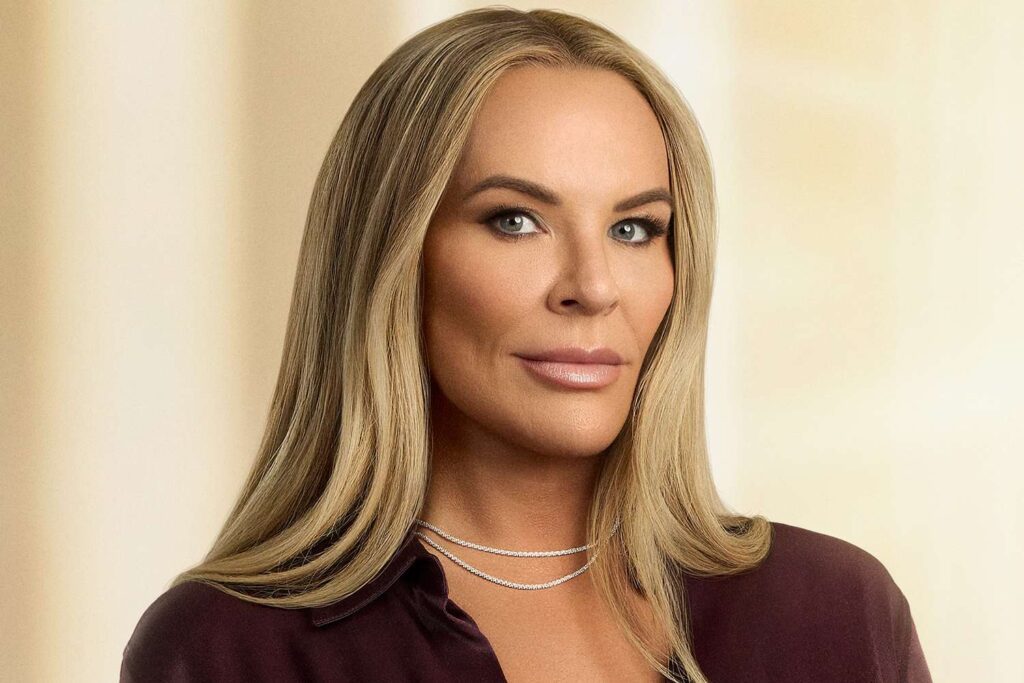NEED TO KNOW
Heather Gay is still working through a crisis of faith — and the cameras are up.
Bravo fans came to know Gay as the voice of reason on the Real Housewives of Salt Lake City, on which she has unpacked her exit from the Church of Jesus Christ of Latter-Day Saints for six seasons. But the reality star is now pulling double duty on the network, as her heavy new docuseries Surviving Mormonism with Heather Gay premieres on Tuesday, Nov. 11 (9:45 p.m. ET/PT).
In the three-part docuseries, Gay — who left the church when she joined RHOSLC — interviews former Mormons about their experiences in the church, including claims of abuse and controversial practices such as conversion therapy.
John Lamparski/Getty
“I never thought that being an antagonist to my faith and identity and family and community would feel this empowering and fulfilling, but it does. I feel compelled to do more,” Gay, 51, tells PEOPLE of sharing stories in Surviving Mormonism. “I feel very, very precious about these survivors, about their willingness to share with me. They’re telling a Real Housewife their darkest secrets. That takes a leap of faith, and I feel such a kinship to them.”
Gay says she has long wanted to make a show like Surviving Mormonism and was inspired by Leah Remini’s work on the Emmy-winning docuseries Scientology and the Aftermath.
“I thought what she did was so important and, in a legitimate way, giving visibility and a platform to voices that were silenced. That was very similar to my experience when I left the Mormon church. I didn’t really realize how similar that experience was until I left,” Gay says.
Getty
She adds: “Because when I was in it, rainbows and unicorns, great. But when you leave and when you draw a line in the sand, I recognized and heard for the first time really just an onslaught of people’s experiences that were about surviving Mormonism. If you’re in it, you don’t hear of those stories. You don’t speak of them. No one talks about them. They are sidelined and silenced and made to disappear. The second you leave, you’re hearing it for the first time. I was hearing criticisms of the church for the first time.”
Gay has said she felt shunned and struggled after leaving the church. She opened up about those experiences on RHOSLC and in her bestselling books Bad Mormon and Good Time Girl — and her social media DMs have been flooded with stories from LDS members past and present who relate to her.
“Leaving has taught me and exposed me to so many people that had stories to tell and wanted to share that with me,” she says. “I suddenly had this opportunity to meet people from all over the world that wanted to share their stories with me, and that felt very powerful and inspiring. I felt like a deep responsibility; I felt obligated.”
Koury Angelo/Bravo
Speaking to PEOPLE before the docuseries’ premiere, Gay says, “I feel I’m always scared of the church; I’m scared all the time.” But she insists the show is meant to give people a voice, not a direct attack on the LDS.
“I don’t think this is a show about tearing down the church. I think this is a show about giving space to survivors that experience the shadow side of something that we all find fascinating, but no one ever talks about. I feel more afraid of people not speaking out — of not acknowledging these survivors, of not honoring them and their stories — more than I’m afraid of the church. It’s not about the church. It’s about what people that survived the church have to say now,” she says.
Adds Gay: “I think the church should be worried about the show because the church says that they stand for truth and righteousness and love and humanity. These are members of your church that dedicated their lives, paid 10% of their income, 50% of their time, and were so allegiant to the church that they didn’t even report their abuse to authorities because they loved the church more. If the church can’t honor them and their legacy because they’re telling what happened to them … If the church turns a blind eye to this, then the church does not practice what they preach.”
Meeting survivors and hearing their stories has been a part of Gay’s own healing journey as an ex-Mormon.
“It’s very difficult for me to hear criticism about the church. It’s very difficult for me to believe the stories that don’t line up with the church’s values,” she says. “When I was doing [interviews], I almost felt guilty because it felt like… I was listening to their stories, but it was a process for me. I had to hear the Mormon thought like, ‘Could never happen, not true,’ and just dismiss it from my brain and flip the lens and kind of look at them with, this is going to sound crazy, the same openness and absolute belief that I had for the principles of the church … I was deconstructing with every interview.”
While Gay is no longer a part of the church, she says she still has a “complicated” relationship with God, and her faith, today.
“I pray like a Mormon, I think like a Mormon, I read scriptures that are Mormon scriptures, and all of that now is tainted to me, severely tainted,” she says. “The more I learn, the more I have a longing to find God and to redefine God in my life because I built my life around God.”
Despite everything, Gay can still find some positive aspects in the church.
“I see value in community, and I see value in belonging; I see value in God, I see value in shared love of God, I see value in people gathering in a church and singing to Him and feeling love and feeling closeness, and I see value in a spiritual practice,” she says. “But it’s hard for me to extract the valuable, beautiful parts about Mormonism from the parts that are so stifling and dangerous.”
Bravo Media
As the show premieres, Gay knows she’ll face criticism and skepticism, especially from practicing Mormons.
“There’s a part of me that is prepared to be disbelieved and disregarded and dismissed. It’s just exactly what happened my whole childhood: We don’t allow for criticism, and we don’t give that any recognition. We paint this veneer,” she says. “That’s why the show’s important because Mormon stories matter.”
And sharing those stories, “fuels me,” Gay says. “I feel so grounded and purposeful.”
The first episode of Surviving Mormonism with Heather Gay airs Tuesday, Nov. 11 at 9:45 p.m. ET/PT. All three episodes of season 1 will be streaming on Peacock on Wednesday, Nov. 12.

